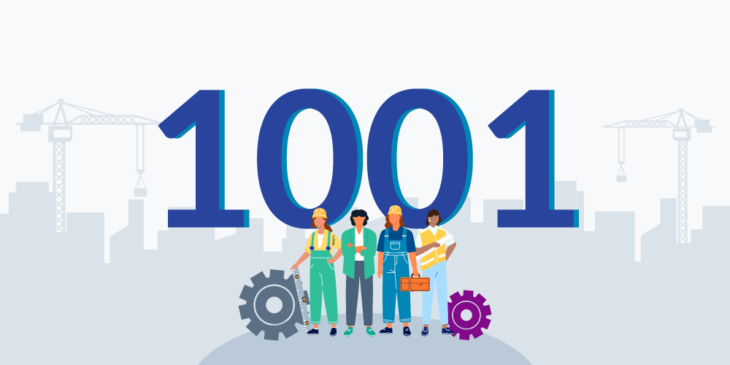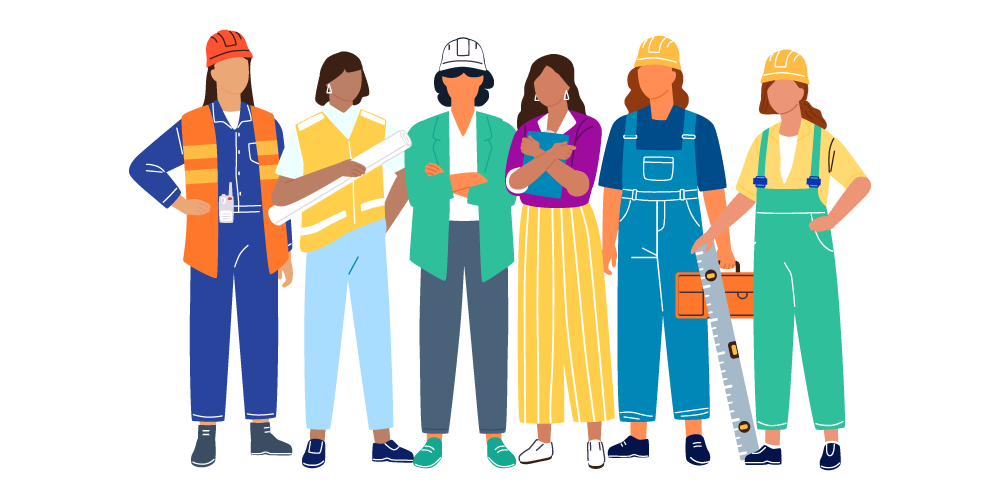
Construction can — quite literally — be a backbreaking business. But not everyone in the industry faces the same challenges. Those on the jobsite and in the trades endure their share of physical hardships, and office teammates face their own share of stress and mental hurdles.
While many of the most-reported challenges — slow payment, long hours, dirt, and weather — don’t discriminate based on gender, some are unique to the women in the industry, who make up just 11% of construction employment.
By and large, women are happy to be here: In a 2021 survey of 1,001 women in construction, 78% said they love their jobs. But they talked about their biggest challenges, too. Here are eight of the top challenges women say they face in construction.

See what 1,001 women in construction said about their jobs, their coworkers, and the state of the industry.
1. R-E-S-P-E-C-T
Earning respect was, by far, the most common challenge cited by women in the survey. While 80% of women surveyed said they feel that their coworkers respect women, only 65% said that their company’s leadership listens to men and women equally.
“The most challenging part of working in the construction industry as a woman is earning the same amount/an ounce of respect men get for doing the same thing.”
Subcontractor specialist, California
“The most challenging part of working in the construction industry as a woman is earning the same amount/an ounce of respect men get for doing the same thing,” said a specialist for a California subcontractor.
Many women felt their knowledge and opinions don’t carry the same weight as their male counterparts, and were critical of the constant struggle to have their voice heard.
One woman who works at a nuclear power company in Georgia said it’s her biggest challenge. “Many times my suggestions are ignored until my coworkers come to the same conclusion,” she said.
For an office manager in North Carolina, performing well isn’t always enough. “On a particular job I did for the federal government, I got rave reviews from the CO but the owner of my company downplayed my success,” she said.
At times, she has to pull in male colleagues to deliver a message on her behalf. “I have had to bring a colleague with me to meetings before, tell him what I needed him to say for the owner of my company and the owner of the project to listen,” she said. “I don’t have time to argue.”
“People accept without question that you know how the paperwork and clerical part of the job works,” a manager for a Colorado general contractor said. “But there is always that person who doesn’t believe that you know anything about actual labor and building knowledge. I think because they associate that if you can’t physically do the labor part you don’t have any knowledge about how to do it correctly.”
A project manager in Georgia said, in her experience, it’s often a generational issue.
“I think the older generation of clients — who want to speak with a male regarding decisions or changes being made in regards to his project — is the most challenging,” she said. “I don’t want to lose a client over something that seems small, even though I know it is a much bigger issue that has to be corrected if women want to see a positive change. I have no problem correcting coworkers, but it can get messy with a few select clients.”
“I am professional and personable and go to great lengths to make sure I present myself accordingly, but in this industry, I am spoken to like a child a lot of time.”
Office Administrator, Minnesota
Another manager for a subcontractor in Utah said, in her experience, it’s not a problem with one company, but an industry-wide culture.
“My company is FANTASTIC and empowering, however many MANY other companies/general contractors/suppliers or even customers we work with do not take me seriously because I am not a man,” she said. “They assume I do not know what I’m talking about. And occasionally they are FAR more rude or abrasive towards me than they are my male counterparts.”
An office administrator in Minnesota said she deals with condescension almost daily.
“I am very good at my job and I do it well,” she said. “I am professional and personable and go to great lengths to make sure I present myself accordingly, but in this industry, I am spoken to like a child a lot of time. It’s assumed I don’t know what I’m doing and that is very frustrating. I love this industry and I see potential for so much growth and I really want to be a part of that, but it’s going to take a long time to shift the thinking that this is just a man’s industry.”
Like many jobs that require physical strength, construction has long been seen as a man’s domain — people often assume that women work in the office and don’t have the technical know-how. As a result, many women feel like they have to constantly prove their knowledge — and their worth.
“It’s fairly common for me to run into someone who assumes I’m just an office administrator or that I don’t have specialized knowledge,” said one project manager in Michigan. “I have to demonstrate more technical know-how than my male counterparts to be taken seriously.”
Challenging assumptions isn’t just a struggle for women in the field: Even women who work in the office find themselves having to challenge assumptions about their expertise. A financial controller in Washington, D.C. said her expertise is often questioned.
“As a woman financial professional it is very challenging to get my male counterpart to respect that I will know about how to structure financing for construction loans,” she said. “Often I would be overlooked to give my opinion and recommendations on the best financing structure on a deal.”
2. Getting paid
When asked about their biggest challenges, the president of a subcontractor in Maryland simply said, “Slow payments.”
She’s not alone: The construction industry’s payment problems are an open secret. National construction payment reports consistently show that at least half of contractors don’t get paid on time or in full — a problem that disproportionately affects subcontractors.
Of course, that doesn’t mean that GCs don’t have cash flow problems. The CEO of a general contractor in Arizona said that financial overhead is her biggest challenge. “I often feel like a bank,” she said.
In fact, a lot of construction businesses do operate like a (poorly run) bank, providing work or materials to customers on credit without taking steps to secure or speed up their payments. With large upfront costs and long delays before invoices are paid, cash flow is a constant struggle for many construction businesses. For the women who work in credit or financial roles, this problem is often their biggest source of stress.
“Customers never want to pay when their bills are due,” said a treasurer in California. “We extend them 45 days and then have to dun for payment especially during the Pandemic.” (For those not in the know, “dun” is short for Dunning, a type of demand letter sent to delinquent customers.)
Collecting on overdue accounts was a common challenge that many of the women shared in the survey — and it rarely mattered who they were working for.

Thea Dudley teaches credit & collections
Join the free certificate course to learn the foundations of credit & collections in construction with 30-year industry veteran Thea Dudley.
The COO for a New York subcontractor said unfair payments are her biggest challenge — even on government-run projects.
“Owners on public works projects ignore prompt payment rules [and] hire people unfamiliar with the construction process,” she said. “Owners profess an equal and fair table is set, but reality is far from truth.”
A controller in North Carolina said she has similar issues on restoration projects, too, where customers try to negotiate a lower price after the job is complete. “Since 80% of our work is funded by insurance companies, I have seen customers spend the funds that their insurance provided — and then cry afterwards because they can’t pay,” she said.
A project manager in Utah even said that pay-when-paid clauses were her least favorite thing about working in construction. “It makes cash flow difficult,” she said.
“I think some customers believe we can control the weather!”
Manager, General Contractor, Georgia
3. Bad weather
For many women, working in unfavorable weather was their job’s biggest challenge. “The elements would have to be my least favorite, whether it’s rainy, cold, etc,” said a tradesperson in Georgia.
Extreme weather isn’t just a problem for women in the field. Construction projects are run on tight deadlines, and bad weather can often cause jobs to run late or over budget. Delays can cause scheduling problems, lost work, and late payments.
“My least favorite thing about construction are the delays due to weather,” said an office administrator in North Carolina. “It can halt a project for days, weeks or even months at a time and severely affect the progress.”
A manager for a general contractor in Georgia said constant delays were her biggest challenge. “I think some customers believe we can control the weather!” she said.
Of course, just because the weather is a challenge doesn’t mean they can’t deal with it. “I am in Indiana, and I am not a fan of working outside in the cold seasons,” said a manager for an equipment rental company, “but I just bundle up and handle it.”
4. Getting their hands dirty (literally)
Construction can be a literally dirty job. Even office teammates aren’t completely safe from dirt and dust getting into workspaces and sticking around.
“The concrete dust is everywhere,” said an administrative assistant for a concrete supplier. “Fortunately for me, I’m in the office so I don’t have to deal with that unless I go down to the warehouse for something.”
For a purchaser for a supplier in Ohio, it’s her least favorite part of the industry. “Dust in my office, dust on my clothes, dust that travels home in my car,” she said. “So much dust.”
A project manager in North Carolina said, while she’s happy she chose this career, she could do without the dirt. “Red clay dirt stains everything!” she warned.
While many disliked the dirt, at least one woman had a different perspective — a project manager in Texas said that construction’s reputation as a dirty job is actually a misconception. “That’s why we need to educate,” she said.
“I find myself continually following-up, reiterating, reminding, and holding grown men’s feet to the fire to complete even the most basic tasks.”
Manager, Subcontractor, South Carolina
5. Communication issues
A number of women said that poor communication is a problem in the industry. One project manager in California said the worst part of working in construction is “the never-ending battles between GC and subcontractors.”
Another project manager for a California subcontractor said that architects and GCs don’t always appreciate the expertise of their subcontractors. “Generally this causes poor communication and slows down the project’s progress,” she said.
Of course, communication is a two-way street — it’s not always the fault of those at the top. A project manager for a GC in Idaho said her biggest pet peeve is “subcontractors that don’t communicate schedule changes.”
Several women said the problem is communicating with men in general.
“I find myself continually following-up, reiterating, reminding, and holding grown men’s feet to the fire to complete even the most basic tasks,” said a manager for a South Carolina subcontractor.
An office manager in North Carolina agreed with that sentiment, mentioning male coworkers. “They don’t communicate well with anyone and things get lost or not communicated that should be passed along,” she said.
The CEO of a subcontractor in Florida said that construction has a problem with lying. “
The industry is saturated with men (sorry) who can’t just accept blame, be honest [about] timelines, and not be shady when it comes to getting a project done,” she said. “Lying and manipulation seems to be way too common.”
But at least one woman in California doesn’t blame men for communication problems — her biggest challenge is communicating with competitive women. “Other women are threatened by other women in this business,” she said. “This makes it more difficult when communicating and succeeding.”
“I am the only female technical professional in my office and not physically being in the same room with other female team leaders and technical professionals has been isolating.”
Engineering firm worker, Michigan
6. The lack of other women
Women make up just 11% of the construction industry in the US — which means that, particularly for women who work in smaller companies, they may be the only woman in the office or on the jobsite. An office administrator in Virginia said the lack of women is her #1 challenge. “You’re the only woman most men see in their entire day of work,” she said. “This leads to some unwanted treatment.”
For many, the lack of women in the industry sometimes means less access to support. In the survey, 45% of women said they don’t have access to a mentor — either a man or a woman — and 2 in 3 don’t feel like they have opportunities to network with other women.
One woman who works for an engineering firm in Michigan said the pandemic has made the problem worse for her. “COVID leaves me isolated,” she said. “I am the only female technical professional in my office and not physically being in the same room with other female team leaders and technical professionals has been isolating. Team meetings are not the same as grabbing lunch with other women.”
An engineer in California said that the lack of other women with diverse interests has led to attention from men in her field who don’t understand “non-traditional” lifestyles.
“Getting harassed or questioned when someone asks why you’re unmarried, it seems like an inappropriate question to ask someone in the workplace,” she said. “There are many more aggressive forms of harassment that don’t happen as frequently, but this is a topic that many people don’t respect or acknowledge simply because they feel they aren’t harassing you by simply ‘asking questions.’”
An office administrator in North Carolina said she misses the daily interactions she had with women in previous jobs.
“I’ve worked in female-dominated industries, and for the past ten years now I have worked in male-dominated industries,” she said. “I find that women are more collaborative, and I’m beginning to miss that here.”
“While we know construction will always be needed, the cycles it goes through are sometimes unnerving.”
Office administrator, Georgia
7. Uncertainty
Nothing is certain, as they say, except for death and taxes -— and construction projects are no exception. Project timelines and specs change frequently, creating a source of consternation for many women in the building sector.
Anytime a change affects the scope or price of work, change orders are necessary — but they can be a hassle on a complicated project. When asked about her least favorite part of her job, one manager in Arizona said, “Completion delays and change orders. Delays because of change orders. Did I mention change orders?”
Another woman who described herself as a ‘controlled person’ said the constant change was her least favorite thing — but it’s helping her get better at her job.
“Sometimes things do not go as planned, [a] you can’t ‘predict the weather’ kind of thing,” she said. “But this is developing my patience and adaptation in projects.”
Changes on construction jobs don’t just affect their work, either. A project engineer for a GC in Kansas said it bleeds over into her personal life, too. “You never know when things will go left, so you don’t even plan for things after work,” she said.
Construction work is affected by larger forces, too. Projects can be delayed or shut down by economic, political or health reasons, as the industry experienced throughout the pandemic. For the president of an Ohio subcontractor, uncertainty on public works projects can affect her bottom line. “The work is often seasonal,” she said. “The government funding of infrastructure is inconsistent, [and] the risk becomes greater every year.”
The fact is that the building industry is inherently risky — construction companies are always at risk of failure, whether in a booming economy or a recession.
An office administrator in Georgia said that economic forces are the main source of stress in her job.
“I feel that construction is impacted most heavily when there are market swings, the pandemic we are in, etc. While we know construction will ALWAYS be needed, the cycles it goes through are sometimes unnerving,” she said. “Thankfully, I am part of a great company led by sound minds and dependable ownership who have shown great skill navigating these cycles.”
8. Port-a-potties
Portable restrooms are a sadly unavoidable staple of any construction jobsite. While they likely aren’t a highlight for anyone who works in the field, man or woman, several women called them out specifically as their least favorite part of the job: “The porta potty situation!” exclaimed one woman on the worst part of working in construction.
The president of a Washington subcontractor agreed. “They are small and set up for men,” she said. “Ladies have hygiene to take care of monthly. When your knees almost hit the closed door, hygienic care becomes an issue. An ADA port-a-potty would fix this issue.”
Despite the challenges, women love construction
Every job has its ups-and-downs, and construction is no different. But the challenges aren’t a deterrent to the women in the industry. In the survey, nearly 8 in 10 women said they love working in construction, and 60% said there are good opportunities for women in the building sector.
Many women even cited “the challenges” as the most rewarding part of the job.
“I am learning new things all the time,” said a woman who works in commercial sales in Ohio. “When I complete a large project it gives me a sense of accomplishment.”

More Women in Construction
Anne Pfleger, CIT
President, National Association of Women in Construction
Araceli Carlos
Project Engineer, Dalke Construction